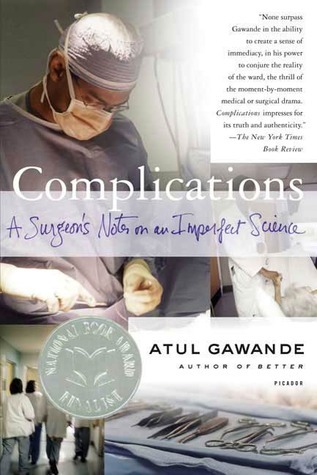More on this book
Community
Kindle Notes & Highlights
Skill, surgeons believe, can be taught; tenacity cannot.
It is one thing to be aware of one’s limitations. It is another to be plagued by self-doubt.
Even worse than losing self-confidence, though, is reacting defensively. There are surgeons who will see faults everywhere except in themselves. They have no questions and no fears about their abilities. As a result, they learn nothing from their mistakes and know nothing of their limitations. As one surgeon told me, it is a rare but alarming thing to meet a surgeon without fear. “If you’re not a little afraid when you operate,” he said, “you’re bound to do a patient a grave disservice.”
This sort of burnout is surprisingly common. Doctors are supposed to be tougher, steadier, better able to handle pressure than most. (Don’t the rigors of medical training weed out the weak ones?) But the evidence suggests otherwise. Studies show, for example, that alcoholism is no less common among doctors than among other people. Doctors are more likely to become addicted to prescription narcotics and tranquilizers, presumably because we have such easy access to them. Some 32 percent of the general working-age population develops at least one serious mental disorder—such as major depression,
...more
Nonetheless, estimates are that, at any given time, 3 to 5 percent of practicing physicians are actually unfit to see patients.
He’d pull Goodman aside, ask how he was doing, tell him that people had concerns. Another took the tough-love approach: “I said to him straight out, ‘I don’t know what makes you tick. Your behavior is totally bizarre. The scary thing is I wouldn’t let my family members go near you.’”
that the same neuromodule can go off, generating genuine toe pain, without a toe’s having been stubbed at all.
You can imagine forces in the brain vying to make you feel hungry or full. You have mouth receptors, smell receptors, visions of tiramisu pushing one way and gut receptors another. You have leptins and neuropeptides saying you have either too much fat stored or too little. And you have your own social and personal sense of whether eating more is a good idea. If one mechanism is thrown out of whack, there’s trouble.
The researchers found no improvement. Regardless of the decade, physicians missed a quarter of fatal infections, a third of heart attacks, and almost two-thirds of pulmonary emboli in their patients who died. In most cases, it wasn’t technology that failed. Rather, the physicians did not consider the correct diagnosis in the first place. The perfect test or scan may have been available, but the physicians never ordered it.
In a 1976 essay, the philosophers Samuel Gorovitz and Alasdair MacIntyre explored the nature of fallibility. Why would a meteorologist, say, fail to correctly predict where a hurricane was going to make landfall? They saw three possible reasons. One was ignorance: perhaps science affords only a limited understanding of how hurricanes behave. A second reason was ineptitude: the knowledge is available, but the weatherman fails to apply it correctly. Both of these are surmountable sources of error. We believe that science will overcome ignorance, and that training and technology will overcome
...more
relinquishing my hard-won autonomy really the right thing to do? Carl Schneider, a professor of law and medicine at the University of Michigan, recently published a book called The Practice of Autonomy, in which he sorted through a welter of studies and data on medical decision making, even undertaking a systematic analysis of patients’ memoirs. He found that the ill were often in a poor position to make good choices: they were frequently exhausted, irritable, shattered, or despondent. Often, they were just trying to get through their immediate pain, nausea, and fatigue; they could hardly
...more


